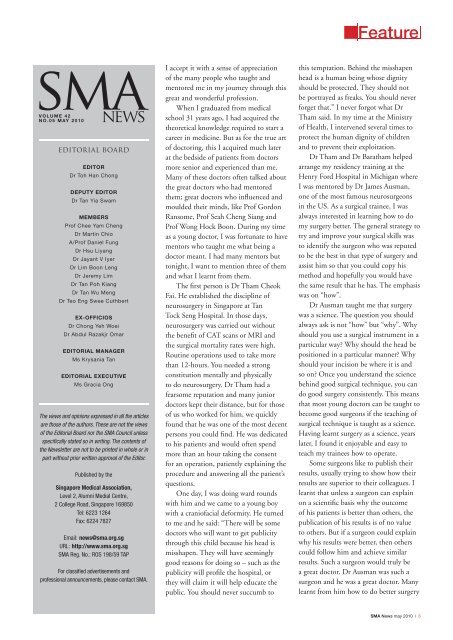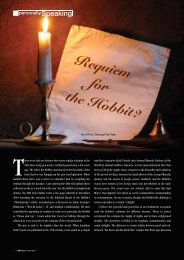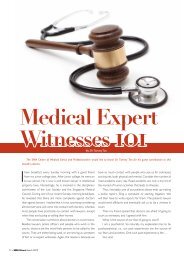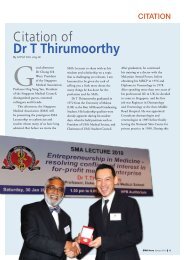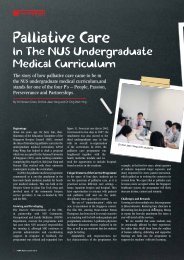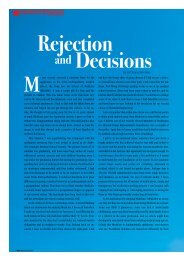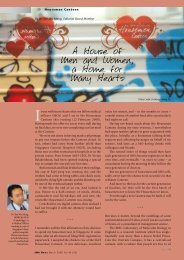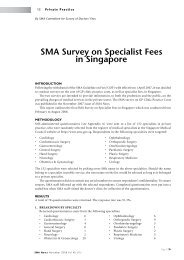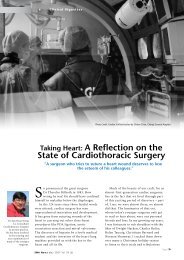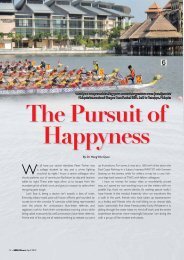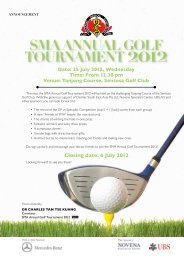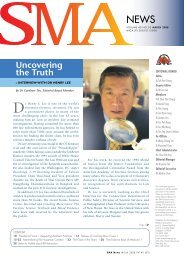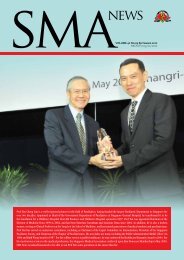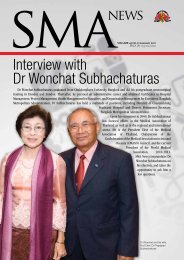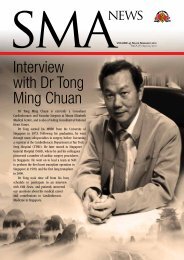Annual Dinner 2010 - SMA News - Singapore Medical Association
Annual Dinner 2010 - SMA News - Singapore Medical Association
Annual Dinner 2010 - SMA News - Singapore Medical Association
Create successful ePaper yourself
Turn your PDF publications into a flip-book with our unique Google optimized e-Paper software.
V O L U M E 4 2<br />
N O . 0 5 M AY 2 0 1 0<br />
EDITORIAL BOARD<br />
EDITOR<br />
Dr Toh Han Chong<br />
DEPUTY EDITOR<br />
Dr Tan Yia Swam<br />
MEMBERS<br />
Prof Chee Yam Cheng<br />
Dr Martin Chio<br />
A/Prof Daniel Fung<br />
Dr Hsu Liyang<br />
Dr Jayant V Iyer<br />
Dr Lim Boon Leng<br />
Dr Jeremy Lim<br />
Dr Tan Poh Kiang<br />
Dr Tan Wu Meng<br />
Dr Teo Eng Swee Cuthbert<br />
EX-OFFICIOS<br />
Dr Chong Yeh Woei<br />
Dr Abdul Razakjr Omar<br />
EDITORIAL MANAGER<br />
Ms Krysania Tan<br />
EDITORIAL EXECUTIVE<br />
Ms Gracia Ong<br />
The views and opinions expressed in all the articles<br />
are those of the authors. These are not the views<br />
of the Editorial Board nor the <strong>SMA</strong> Council unless<br />
specifically stated so in writing. The contents of<br />
the <strong>News</strong>letter are not to be printed in whole or in<br />
part without prior written approval of the Editor.<br />
Published by the<br />
<strong>Singapore</strong> <strong>Medical</strong> <strong>Association</strong>,<br />
Level 2, Alumni Medial Centre,<br />
2 College Road, <strong>Singapore</strong> 169850<br />
Tel: 6223 1264<br />
Fax: 6224 7827<br />
Email: news@sma.org.sg<br />
URL: http://www.sma.org.sg<br />
<strong>SMA</strong> Reg. No.: ROS 198/59 TAP<br />
For classified advertisements and<br />
professional announcements, please contact <strong>SMA</strong>.<br />
I accept it with a sense of appreciation<br />
of the many people who taught and<br />
mentored me in my journey through this<br />
great and wonderful profession.<br />
When I graduated from medical<br />
school 31 years ago, I had acquired the<br />
theoretical knowledge required to start a<br />
career in medicine. But as for the true art<br />
of doctoring, this I acquired much later<br />
at the bedside of patients from doctors<br />
more senior and experienced than me.<br />
Many of these doctors often talked about<br />
the great doctors who had mentored<br />
them; great doctors who influenced and<br />
moulded their minds, like Prof Gordon<br />
Ransome, Prof Seah Cheng Siang and<br />
Prof Wong Hock Boon. During my time<br />
as a young doctor, I was fortunate to have<br />
mentors who taught me what being a<br />
doctor meant. I had many mentors but<br />
tonight, I want to mention three of them<br />
and what I learnt from them.<br />
The first person is Dr Tham Cheok<br />
Fai. He established the discipline of<br />
neurosurgery in <strong>Singapore</strong> at Tan<br />
Tock Seng Hospital. In those days,<br />
neurosurgery was carried out without<br />
the benefit of CAT scans or MRI and<br />
the surgical mortality rates were high.<br />
Routine operations used to take more<br />
than 12-hours. You needed a strong<br />
constitution mentally and physically<br />
to do neurosurgery. Dr Tham had a<br />
fearsome reputation and many junior<br />
doctors kept their distance, but for those<br />
of us who worked for him, we quickly<br />
found that he was one of the most decent<br />
persons you could find. He was dedicated<br />
to his patients and would often spend<br />
more than an hour taking the consent<br />
for an operation, patiently explaining the<br />
procedure and answering all the patient’s<br />
questions.<br />
One day, I was doing ward rounds<br />
with him and we came to a young boy<br />
with a craniofacial deformity. He turned<br />
to me and he said: “There will be some<br />
doctors who will want to get publicity<br />
through this child because his head is<br />
misshapen. They will have seemingly<br />
good reasons for doing so – such as the<br />
publicity will profile the hospital, or<br />
they will claim it will help educate the<br />
public. You should never succumb to<br />
Feature<br />
this temptation. Behind the misshapen<br />
head is a human being whose dignity<br />
should be protected. They should not<br />
be portrayed as freaks. You should never<br />
forget that.” I never forgot what Dr<br />
Tham said. In my time at the Ministry<br />
of Health, I intervened several times to<br />
protect the human dignity of children<br />
and to prevent their exploitation.<br />
Dr Tham and Dr Baratham helped<br />
arrange my residency training at the<br />
Henry Ford Hospital in Michigan where<br />
I was mentored by Dr James Ausman,<br />
one of the most famous neurosurgeons<br />
in the US. As a surgical trainee, I was<br />
always interested in learning how to do<br />
my surgery better. The general strategy to<br />
try and improve your surgical skills was<br />
to identify the surgeon who was reputed<br />
to be the best in that type of surgery and<br />
assist him so that you could copy his<br />
method and hopefully you would have<br />
the same result that he has. The emphasis<br />
was on “how”.<br />
Dr Ausman taught me that surgery<br />
was a science. The question you should<br />
always ask is not “how” but “why”. Why<br />
should you use a surgical instrument in a<br />
particular way? Why should the head be<br />
positioned in a particular manner? Why<br />
should your incision be where it is and<br />
so on? Once you understand the science<br />
behind good surgical technique, you can<br />
do good surgery consistently. This means<br />
that most young doctors can be taught to<br />
become good surgeons if the teaching of<br />
surgical technique is taught as a science.<br />
Having learnt surgery as a science, years<br />
later, I found it enjoyable and easy to<br />
teach my trainees how to operate.<br />
Some surgeons like to publish their<br />
results, usually trying to show how their<br />
results are superior to their colleagues. I<br />
learnt that unless a surgeon can explain<br />
on a scientific basis why the outcome<br />
of his patients is better than others, the<br />
publication of his results is of no value<br />
to others. But if a surgeon could explain<br />
why his results were better, then others<br />
could follow him and achieve similar<br />
results. Such a surgeon would truly be<br />
a great doctor. Dr Ausman was such a<br />
surgeon and he was a great doctor. Many<br />
learnt from him how to do better surgery<br />
<strong>SMA</strong> <strong>News</strong> may <strong>2010</strong> |


